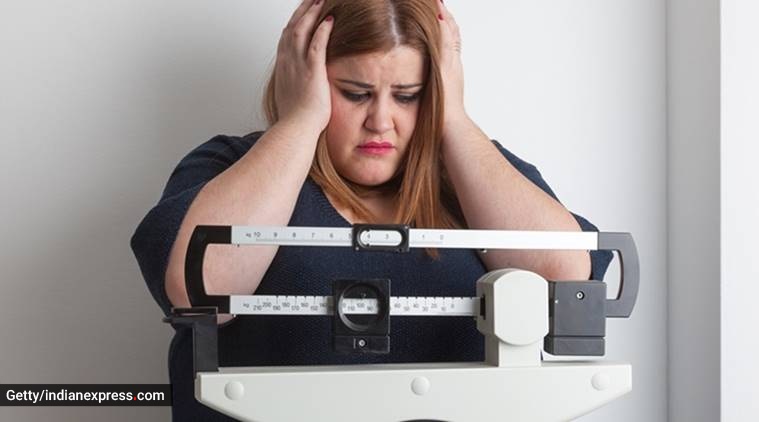 Limit the fat, sugar and salt in your diet. Consult your general practitioner for that. (Source: Getty Images/Thinkstock)
Limit the fat, sugar and salt in your diet. Consult your general practitioner for that. (Source: Getty Images/Thinkstock)
In an alarming statistic, younger people who are overweight are considered at a greater risk of developing certain cancers. According to a study published in the Journal of Internal Medicine, there were 20,706 cancers among 3,13,321 adults diagnosed with weight issues and compared with 18,480 cancers that were expected based on information from the general population. This corresponds to a 12 per cent higher risk associated with overweight and obesity.
The link between obesity and cancer is already well-established. Obesity rates are accelerating in young people, said Dr Vikas Goswami, senior consultant medical oncologist, Max Hospital, Vaishali. Extra body fat undoubtedly lowers the immune system of the body, and functioning of the hormones and cells which further results in abnormal number of cells and can increase the risk of tumour formation. Obesity among young adults is also driving up the rates of cancer, including colorectal cancer, pancreatic cancer, to some extent kidney cancer, gallbladder cancer, uterine cancer and multiple myeloma. These cancers are often not discovered in younger people until the disease is advanced, when it’s harder to treat.
How does obesity lead to cancer?
Fat is an active tissue; it doesn’t just sit there. It can become dysfunctional, resulting in inflammation, which increases the risk of developing cancer. Many of the cancers linked to obesity are in organs that are surrounded by pads of fat.
In addition, excess fat can influence the whole body. For instance, people with dysfunctional fat tissue often have altered levels of hormones such as insulin and estrogen in their blood. These changes can damage DNA and lead to several cancers.
Are women more prone to obesity-related cancer than men?
Women who are overweight tend to have higher blood insulin levels which have been linked to some cancers, including breast cancer.
The link between weight and breast cancer risk appears complex, since the risk appears to be more in women who gained weight as an adult but not for those who have been overweight since childhood. It also depends on the area of fat deposition. Excess fat in the waist area may carry more risk than the same amount of fat in the hips and thighs.
What about people who are not obese?
People who are not obese need to be careful, too. Having too much fat even if you have a normal body weight or BMI (body mass index) can increase the risk of developing cancer and heart disease.
Lifestyle management is the key to beat obesity-related cancer
We need to start thinking of some foods and high-sugar beverages in a similar way that we think about tobacco: unnecessary, addictive, and harmful.
The most definite way to test whether avoiding weight gain or losing weight will decrease the risk of cancer comes only through a controlled clinical trial. Whether losing weight or avoiding weight gain prevents cancer come mainly from group case studies but lifestyle factors such as eating a healthy diet, maintaining a healthy weight and exercising, in addition to not smoking, can have a significant impact on reducing cancer risk.
Follow these simple steps to avoid obesity:
*Follow a balanced diet.
*Get creative with exercise. Pick out interesting ways to move your body.
*Eat three meals everyday breakfast, lunch and dinner.
*Eat five servings of fruits and vegetables in a day.
*Limit the fat, sugar and salt in your diet. Consult your general practitioner for that.
*Quit smoking and drinking.
*Go for brisk walking twice in a day for 30 minutes.
Follow these tips to combat cancer by changing your diet and exercise rules:
*Target plant based diets.
*Consume omega-3.
*Eat more yogurt.
*Reduce meat consumption.
*Try cancer fighting foods such as ginger, garlic, onion, turmeric, coriander, leafy green veggies, berries, oranges, oily fish, sunflower seeds, pumpkin seeds, mushrooms, beetroot and pulses as they all have cancer fighting properties. This can help support the entire body and mind in the healing process that can sometimes be long and very difficult.
*Stay hydrated.
*Wash your veggies and fruits in a different manner by using vinegar and salt.
*Include some supplements in your routine like folic acid which helps in reducing the risk of breast cancer. Folic acid (with B12) can help prevent cancer of the colon; Vitamin D reduces risk of prostate, colorectal and other forms of cancer, etc.